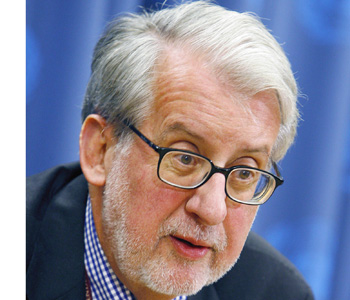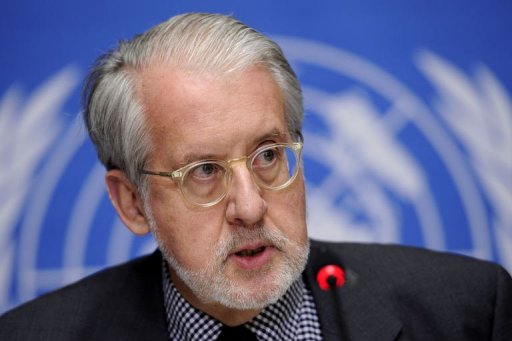The military option in Syria: difficult and risky (Paulo Sergio Pinheiro, UN)

(BRUSSELS2) Paulo Sergio Pinheiro, the president of the Independent International Commission of Inquiry on Syria was in Brussels on Thursday (March 15), in front of the press (including B2). Mandated by the UN Human Rights Council, le Professor Pinheiro - a Brazilian academic who has a long experience in this kind of international inquiry commissions - insisted on the humanitarian nature of the crisis in Syria. A situation which has deteriorated significantly since November 2011 ". Even access to information becomes difficult and this has been a "significant" obstacle to the investigation. He recognizes it. The Commission " did not have access to Syrian territory. (...) Which does not mean that she did not have access to information from Syria”. But the UN rapporteur is, despite everything, opposed to any form of military intervention or even arming of the opposition which could increase the risk of violence, advocating more for a political solution.
Humanitarian aid is not reaching everywhere in Syria
For Paulo Sergio Pinheiro, “ the problem is access. (...) The first thing to do now is to open access to humanitarian aid ". However " there is no humanitarian crisis in all of Syria “, he explains; the UN is already active in Syria in terms of humanitarian aid. But " only where she has access ". It is therefore necessary to open humanitarian corridors. The problem is that this can only be done by foreign armed forces, Mr Pinheiro remarks.
A military intervention cannot succeed, Syria is not Libya
However, this military option was quickly ruled out by Mr. Pinheiro. " We do not believe that a military intervention can succeed », especially since the number of victims would then be “thousands, not hundreds ". The teacher warns: "Let's not look at Syria while thinking of Libya ". An important argument against the idea of such an intervention: the Syrian army is not the Libyan army: it may not be very modern, he says, but " well organised (and) the command string is intact ", or almost: " two generals, a few captains have deserted. This was not the case in Libya where " entire battalions have deserted ". What's more " Libya was a peripheral state while Syria is in a much more complex geostrategic position, being surrounded in particular by Iran or Israel.
Arm the opposition? : not a good idea
Another option being considered is to arm the opposition, which « tries to protect the civilian population”. There too, « it's not a good idea » according to the rapporteur because « it would be a total disaster to turn the situation into a civil war ". Especially since according to the commission of inquiry, there is too much internal dissension in the opposition. While army deserters have organized themselves into the Free Syrian Army (FSA), there are many armed groups, claiming FSA or not, and the report states that " the FSA leadership resides abroad and the commission is unsure what control it has over the various FSA groups in the country ».
"it would be a total disaster to turn the situation into a civil war"
A divided opposition, sometimes extremist
During his speech, Mr Pinheiro insisted on the need for the opposition to unite and adopt a common project vis-à-vis the future, particularly with regard to the balance between the different communities. Especially since within the various factions of the opposition, it would seem that there are " extremist groupss", armed, including members of Al Qaeda according to some sources, even if " the commission could not verify information on the composition, origin and operations of these groups ". And the professor adds in this regard: We have to be careful (because) it is difficult to get information ».
Mixed opinion on sanctions
On the sanctions, Mr. Pinheiro is rather skeptical: they “ are not a strategy in themselves, they are an element of strategy. If there is a strategy, then we can rely on sanctions he explains, doubting their effectiveness on their own. He has experience of Burma - he was special rapporteur on the human rights situation in Burma in 2001 - the transition in this country " is not the consequence of sanctions”. And he warns against "thenegative effects on human rights. An option very clearly stated in the report: The commission of inquiry is not in favor of the imposition of economic sanctions which would have negative effects on the human rights of the population, particularly vulnerable groups ". (...) Moreover, according to mr. Pinheiro” The word itself [penalties] is devastating when you are negotiating ».
The option of political dialogue
Mr Pinheiro therefore advocates a solution "more sophisticated ". The commission of inquiry calls thus "to the urgent opening of a political dialogue "," recommends that the Syrian Arab Republic carry out far-reaching political, justice and security sector reforms " and " to seek technical assistance from the United Nations and the HCDC in particular to carry out the reforms and the consultation process ».
"Two hours of discussion" between Kofi Annan and Bashar Al-Assad are "not enough"
Leave time for the Annan mission
Professor Pinheiro insisted on defending the political option by fully supporting the approach of Kofi Annan, joint envoy of the UN and the Arab League. A "mission impossible". Even getting angry at the criticisms that have been made of this approach and the first failures of the negotiations, he asks that we give him time, which obviously "two hours of discussion" between Kofi Annan and Bashar Al-Assad are not sufficient. In fact, the positions of Mr Annan and Me Pinheiro are substantially similar. Kofi Annan had also given priority to the humanitarian crisis by declaring: "We have to start by stopping the murders, the misfortune and the violence that is happening today and then give time [looking for a] political solution".
